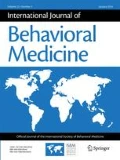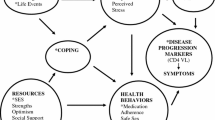Abstract
Background: In vitro evidence has suggested that increasing levels of norepinephrine (NE) can accelerate HIV replication; however, the importance in a clinical setting has not been tested. Purpose: The purpose of this study was to determine if perceived stress as well as the stress hormones NE and cortisol would predict the response to starting a new protease inhibitor (PI) prospectively. Method: Perceived stress, urinary cortisol and norepinephrine, CD4 and viral load (VL) were measured in people with HIV before starting a new PI and six months later (an average of three months after starting the new PI) in order to determine CD4 and VL response to the PI. Results: Higher perceived stress significantly predicted lower effectiveness of the new PI in increasing CD4 and decreasing VL controlling for age, duration of new PI, baseline CD4/VL, sexually transmitted diseases (STDs), and gender / ethnic risk groups. Higher norepinephrine, but not cortisol, predicted worse VL response to PIs and, in fact, mediated the relationship between perceived stress and change in VL. Conclusion: Perceived stress and high norepinephrine levels are prospectively associated with a poorer response to starting a new PI. Assessing stress and norepinephrine levels in patients starting on antiretroviral medications might be clinically useful.
Similar content being viewed by others
References
Antoni, M. H., Baggett, L., Ironson, G., August, S., LaPerriere, A., Klimas, N., et al. (1991). Cognitive behavioral stress management intervention buffers distress responses and immunologic changes following notification of HIV-1 seropositivity. Journal of Consulting and Clinical Psychology, 59(6), 906–915.
Antoni, M. H., Cruess, D., Wagner, S., Lutgendorf, S., Kumar, M., Ironson, G., et al. (2000). Cognitive behavioral stress management effects on anxiety, 24-hour urinary catecholamine output, and T-cytotoxic/suppressor cells over time among symptomatic HIV-infected gay men. Journal of Consulting and Clinical Psychology, 68, 31–45.
Antoni, M. H., Caricco, A., Duran, R., Spitzer, S., Penedo, F., Ironson, G., et al. (2006). Randomized clinical trial of cognitive behavioral stress management on HIV viral load in gay men treated with HAART. Psychosomatic Medicine, 68, 143–151.
Antoni, M. H., Ironson, G., & Schneiderman, N. (2007). Cognitive-behavioral stress management for individuals living with HIV. Facilitator Guide and Workbook. New York: Oxford University Press.
Baron, R. M., & Kenny, D. A. (1986). The moderator-mediator variable distinction in social psychological research: Conceptual, strategic, and statistical considerations. Journal of Personality and Social Psychology, 51, 1173–1182.
Benish, M., Bartal, I., Goldfarb, Y., Levi, B., Avraham, R., Raz, A., & Ben-Eliyahu, S. (2008, in press). Perioperative use of beta-blockers and COX-2 Inhibitors May Improve Immune Competence and Reduce the Risk of Tumor Metastasis. Annals of Surgical Oncology.
Chesney, M. A., Ickovics, J. R., Chambers, D. B., Gifford, A. L., Neidig, J., Zwickl, B., et al. (2000). Self-reported adherence to antiretroviral medications among participants in HIV clinical trials: The AACTG adherence instruments. AIDS Care, 12(3), 255–266.
Cohen, S., & Williamson, G. M. (1988). Perceived stress in a probability sample of the United States. In S. Spacapan & S. Oskamp (Eds.), The social psychology of health (pp. 31–67). Newbury Park, CA: Sage.
Cohen, S., Kamarck, T., & Mermelstein, R. (1983). A global measure of perceived stress. Journal of Health and Social Behavior, 24, 385–396.
Cole, S. W., Kemeny, M. E., Fahey, J. L., Zack, J. A., & Naliboff, B. D. (2003). Psychological risk factors for HIV pathogenesis: Mediation by the autonomic nervous system. Biological Psychiatry, 54, 1444–1456.
Cole, S. W., Korin, Y. D., Fahey, J. L., & Zack, J. A. (1998). Norepinephrine accelerates HIV replication via protein kinase A-dependent effects on cytokine production. Journal of Immunology, 161, 610–616.
Cole, S. W., Naliboff, B. D., Kemeny, M. E., Griswold, M. P., Fahey, J. L., & Zack, J. A. (2001). Impaired response to HAART in HIV-infected individuals with high autonomic nervous system activity. Proceedings of the National Academy Sciences of the United States of America, 98, 12695–12700.
Gordillo, V, Arno, J., Soriano, V., & Gonzalez-Lahoz, J. (1999). Sociodemographic and psychological variables influencing adherence to antiretroviral therapy. AIDS, 13, 1763–1769.
Ickovics, J. R., Hamburger, M. E., Vlahov, D., Schoenbaum, E. E., Schuman, P., Boland, R. J., et al. (2001). Mortality, CD-4 cell count decline, and depressive symptoms among HIV-seropositive women: Longitudinal analysis from the HIV epidemiology research study. Journal of the American Medical Association, 285, 1466–1474.
Ironson, G., Friedman, A., Klimas, N., Antoni, M., Fletcher, M. A., LaPerriere, A., et al. (1994). Distress, denial, and low adherence to behavioral interventions predict faster disease progression in HIV-1 infected gay men. International Journal of Behavioral Medicine, 1(1), 90–105.
Ironson, G., O’Cleirigh, C., Fletcher, M. A., Laurenceau, J. P., Bal-bin, E., Klimas, N., et al. (2005). Psychosocial factors predict CD4 and viral load change in men and women in the era of HAART. Psychosomatic Medicine, 67(6), 1013–1021.
Ironson, G., Antoni, M., Schneiderman, N., Chesney, M., O’Cleirigh, C., Balbin, E., et al. (2002). Coping: Interventions for optimal disease management in HIV. In M. Chesney & M. Antoni (Eds.) Innovative Approaches to Health Psychology: Prevention and Treatment Lessons from AIDS (pp. 167–196). Washington, DC: American Psychological Association.
Ironson, G., Field, T., Scafidi, F., Hashimoto, M., Kumar, M., Kumar, A., et al. (1996). Massage therapy is associated with enhancement of the immune system’s cytotoxic capacity. International Journal of Neuroscience, 84, 205–217.
Kemeny, M. E., & Dean, L. (1995). Effects of AIDS-related bereavement on HIV progression among NYC gay men. AIDS Education Prevention, 7(Suppl. 5), 36–47.
Kopnisky, K. L., Stoff, D. M., & Rausch, D. M. (2004). Workshop report: The effects of psychological variables on the progression of HIV-1 disease. Brain, Behavior, and Immunity, 18(3), 246–261.
Kumar, A. M., Kumar, M., Fernandez, J. B., Mellman, T. A., & Eisdorfer, C. (1991). A simplified HPLC-ECD technique for measurement of urinary free catecholamines. Journal Liquid Chromatography, 14, 3547–3557.
Leserman, J. (2003). HIV disease progression: Depression, stress, and possible mechanisms. Biological Psychiatry, 54, 295–306.
Leserman, J., Petitto, J. M., Golden, R. N., Gaynes, B. N., Gu, H., Perkins, D. O., et al. (2000). Impact of stressful life events, depression, social support, coping, and cortisol on progression to AIDS. American Journal Psychiatry, 157, 1221–1228.
Leserman, J., Petitto, J. M., Gu, H., Gaynes, B. N., Barroso, J., Golden, R. N., et al. (2002). Progression to AIDS, a clinical AIDS condition and mortality; psychosocial and physiological predictors. Psychological Medicine, 32, 1059–1073.
Mackinnon, D. P., & Dwyer, J. H. (1993). Estimating mediated ef- fects in prevention studies. Evaluation Review, 17(2), 144–158.
Markman, P., Salahuddin, S., Veren, K., Orndorff, S., & Gallo, R. (1986). Hydrocortisone and some other hormones enhance the expression of HTLV-III. International Journal of Cancer, 37, 67–72.
Mayne, T. J., Vittinghoff, E., Chesney, M. A., Barrett, D. C., & Coates, T. J. (1996). Depressive affect and survival among gay and bisexual men infected with HIV. Archives of Internal Medicine, 156(19), 2233–2238.
Mellman, T. A., Kumar, A. M., Kulick-Bell, R., Kumar, M., & Nolan, B. (1995). Nocturnal/daytime urine noradrenergic measures and sleep in combat related PTSD. Biological Psychiatry, 38, 174–179.
Munck, A., & Guyre, P. M. (1991). Glucocorticoids and immune function. In R. Ader, D. L. Felton, & N. Cohen (Eds.), Psychoneuroimmunology (2nd ed., pp. 283–310). San Diego, CA: Academic Press.
Patterson, T. L., Semple, S. J., Temoshok, L. R., Atkinson, J. H., McCutchan, J. A., Straits-Troster, K., et al. (1995). Stress and depression symptoms prospectively predict immune change among HIV-seropositive men. Psychiatry, 58, 299–312.
Schneiderman, N., Ironson, G., & Siegel, S. (2005). Stress and health: Psychological, behavioral and biological determinants. Annual Review of Clinical Psychology, 1, 607–628.
Author information
Authors and Affiliations
Corresponding author
Additional information
This research was funded by NIH (R01MH53791 and R01MH066697). Principal investigator: Gail Ironson and T32MH18917. Thanks go to Nathaniel Ezra Kieval for technical help with preparing the manuscript.
Rights and permissions
About this article
Cite this article
Ironson, G., Balbin, E., Stieren, E. et al. Perceived Stress and Norepinephrine Predict the Effectiveness of Response to Protease Inhibitors in HIV. Int. J. Behav. Med. 15, 221–226 (2008). https://doi.org/10.1080/10705500802219606
Issue Date:
DOI: https://doi.org/10.1080/10705500802219606




